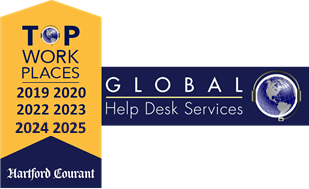- Q1. How will your IT support company improve customer satisfaction?
- Q2. Describe your continuous improvement program
- Q3. How transparent is your pricing model?
- Q4. Do you offer guaranteed service levels?
- Q5. What ongoing training do you provide your agents?
- Q6. Do you offer 24x7x365 availability?
- Q7. Are you based in the same country as us?
- Q8. Do you offer the ability to white label your help desk service?
- Q9. Do you offer detailed analysis and reporting?
- Q10. Do you run a quality assurance program?
- Q11. Do you support new technology rollouts?
- Q12. Will you let us scale our coverage hours on the fly?
- Q13. Do you have experience supporting our industry?
- Q14. Do you have expertise in data security?
- Q15. Will you help us minimize staff turnover?
- Q16. Can you support our internal applications?
- Q17. What ROI can we expect from our investment?
- Q18. Can you help us reduce shadow IT?
- Q19. How do you stay on top of industry best practices?
- Q20. Why should we choose your firm?
You’ve decided to outsource your IT help desk to an IT support company. So far, so good. Outsourcing is often a wise move, as it can:
- Reduce your operating costs
- Improve response times
- Increase your first-call resolution rates
- Help you scale more easily
- Make your ticket escalation process smarter and more efficient
- Reduce your staffing and infrastructure costs
- Help your IT department focus on high-value projects
- And plenty more…if you choose an outsourced IT help desk provider that fits with your business and your users.
So, how do you avoid buyer’s remorse? By asking the right questions.
This guide walks you through the questions to ask – and the answers to watch for – when choosing a help desk IT support company.
After reading this guide, you’ll be more confident and knowledgeable when assessing IT help desk providers, so you can pick the right one for your business.
Ready? Let’s get started.

Question 1
How Will Your IT Support Company
Improve Customer Satisfaction?
Your IT help desk is the face of your entire IT team. So, serving your customers, whether they are internal employees or external customers, should be the No. 1 priority of your help desk.
This means customer satisfaction should be a top-priority KPI for your outsourced help desk, too.
Ask potential vendors: “How, exactly, will you improve customer satisfaction?” Then listen for an answer that demonstrates the vendor is committed to helping you improve the customer experience. They should tell you precisely how they measure it, along with describing the steps they take (such as setting expectations and following up) to move customer satisfaction scores in the right direction.

Question 2
Describe Your Continuous
Improvement Program
As you screen potential vendors, find out what steps they take to continuously improve their services. How do they receive, track, and measure feedback and performance, such as reviewing previously escalated tickets in order to resolve more at the help desk?

An outsourced IT help desk should have a robust continuous improvement program to take your customer service to the next level, i.e., faster ASA, lower ABR, and higher FCR in order to give and more time for Level 2 and 3 folks to focus on higher-value projects.
If your help desk could use some assistance with improving your KPIs, such as First Call Resolution, Average Speed of Answer, and Customer Satisfaction Score, you’ll want an IT Support Company that can help you achieve those goals.

Question 3
How Transparent Is Your
Pricing Model?
When it comes to paying for outsourced IT support, you want no surprises. Some vendors are transparent in their pricing. Other companies … not so much.
There are essentially five IT help desk outsourcing pricing models:
- Pay Per Ticket
- Pay Per Call
- Pay Per Minute
- Pay Per Agent
- Pay Per User

There are advantages and disadvantages to each pricing model. Your goal when screening vendors is to discover just how transparent each vendor is with pricing. Hold their feet to the fire about what you get for your money. Make sure you understand if you will face additional charges, or unexpected fees, or if you will pay for services that you don’t use. You want to trust your IT support company, and trust comes with transparency.

Question 4
Do You Offer Guaranteed
Service Levels?
Every vendor you interview is going to have a Service-Level Agreement (SLA) that defines the level of service that the vendor promises to deliver.
But promises are one thing. What happens if the promises aren’t kept?
Get right to the point with each potential vendor by asking them if they guarantee their help desk service delivery. Ask them about the metrics they use to measure their performance, and about what recourse you have if they fail to deliver on their service-level promises. Listen for the phrases “quality control” and “guarantee.”
Related Reading: Top 4 Help Desk Services KPIs and How to Improve Them

Question 5
What Ongoing Training
Do You Provide Your Agents?
The entire point of an IT help desk is to help users and customers navigate the technology they use today. This means any outsourced help desk vendor you hire must keep up with the latest technology and be able to easily guide users through it.

So, ask each vendor on your shortlist, “What on-going education, training, and coaching do you give your agents to ensure that they are always up-to-date on the latest technology?” And while you are on the topic, ask, “What technical certifications must your agents possess and keep current?”

Question 6
Do You Offer
24x7x365 Availability?
One of the advantages of outsourcing your help desk to an IT support company is it helps you increase your coverage. You can add coverage for evenings and weekends, for example, without hiring a single additional agent.
The ability to increase your coverage is only an option, however, if the help desk provider offers that coverage. Not all outsourced IT help desks do.
To have the most flexibility today and in the future, look for a vendor that offers help desk support 24 hours a day, seven days a week, 365 days of the year, just in case you need it.

Question 7
Are You Based in the
Same Country as Us?
If you are a large enterprise, you likely operate across multiple time zones and in multiple countries. This means you need help desk agents that are awake when your users are awake, and who speak your native language(s) fluently.
This may mean that you want your outsourced help desk provider to be physically located in the same country as you. Or it may mean that you are happy to work with a company that is located in another country than yours, just so long as you are satisfied that their agents work the same hours as you, are fluent in your language, and will not cost more than hiring a domestic firm.
Either way, it’s important to ask about geographical location, time zones, and languages spoken so you know you’ll have the coverage you need.

Global Help Desk Services is a 100% US-based IT support company, and can provide foreign-language agents to ensure your employees and customers get their calls handled with care and efficiency — in their native language.

Question 8
Do You Offer the Ability to White Label Your Help Desk Service?
When it comes to outsourcing your IT help desk, there’s outsourcing and there’s integrated outsourcing. Outsourcing your help desk to an integrated provider means the vendor is integrated with your internal phone system, your networks and your company branding. Your users reach them by dialing a company extension, for example. The agents use email addresses that feature your company domain.
This level of integration is possible thanks to white labeling.
When an IT support company delivers their help desk services as a white label offering, they remove their company name and branding and use yours instead. This results in your users having a seamless experience every time they contact the outsourced help desk.
If delivering this level of integration and seamless user experience is important to your company, look for outsourced help desk firms that offer white label solutions.

Question 9
Do You Offer Detailed Analysis and Reporting?
Outsourced doesn’t have to mean out of your control. Just because you are outsourcing your help desk, you still should have full authority over your help desk operation.
How this works out in real life depends on the help desk company you choose. Some outsourced IT support companies are better than others at keeping you up to date, informed and in control.
So, one of your screening questions should deal with analysis and reporting. Ask each vendor how they collect data and measure the help desk KPIs that matter to you.
Ask them about the reports they generate, how often they report to you about their performance levels, and how decision-making works.
And while you are on the topic, ask each company how often they check in with you about operational issues and how frequently they hold meetings to review performance and recommend improvements.

Question 10
Do You Run a Quality
Assurance Program?
Like it or not, users and customers typically judge your entire IT staff by whether your help desk agents are responsive, polite and competent.
This means quality assurance (QA) is vital to the reputation of your entire IT organization. If you need to maintain (or improve) the quality of your help desk services, and are looking to outsource, you need to pick a help desk supplier that has a reliable QA program. Ask each vendor how they measure the quality of their services.
Ask them how they respond to issues concerning QA. Discuss their QA standards for audio quality, agent ticket quality, agent chat quality and other vital QA metrics.

Question 11
Do You Support
New Technology Rollouts?
 When you launch new technologies, programs and processes, you make your organization more effective and efficient.
When you launch new technologies, programs and processes, you make your organization more effective and efficient.
But you also increase the volume of calls that your help desk receives each day, potentially making your IT help desk overwhelmingly busy as they field calls from users confused by your new platform, program or process.
Managing high call volumes during technology rollouts is a major challenge for many help desks. This means the IT support company you partner with must be able to manage new technology rollouts—no matter what. So, go ahead and ask each potential help desk outsourcing partner how they will support your new technology rollouts.

Question 12
Will You Let Us Scale Our
Coverage Hours on the Fly?
If there is one word that best describes IT help desks, it’s “unpredictable.” No two shifts are the same. No two weeks are the same. Call volumes rise quickly, unexpectedly, and then fall just as surprisingly.
What this means for your company is you need a help desk provider that can scale with you—without breaking a sweat. Will their team complement your internal team, taking nights/weekends, for example? Are they willing to fill in gaps in your schedule as needed, during periods of growth? And will they do so with a smile?
Related Reading: How to Scale Your IT Help Desk Services to Meet Unpredictable Demand

Question 13
Do You Have Experience
Supporting Our Industry?
You need an outsourced help desk provider who speaks your language and the technical language of your users.
But if you operate in a niche or highly regulated industry, you also need an IT support company that understands your industry’s language and its challenges.
If you operate in the health care, government or financial services sectors, for example, you need outsourced help desk agents who understand legislation around health information privacy (HIPAA, for example) or regulations around data privacy in financial services (Sarbanes-Oxley, for example).

Question 14
Do You Have Expertise
in Data Security?
Outsourcing just about any area of your operation comes with risks to data privacy. Hackers, after all, may decide that the easiest way to penetrate your cybersecurity defenses is to attack one of your partners or suppliers.
During your screening process, it’s smart to ask each vendor some tough questions, such as:
- How do you mitigate known cybersecurity vulnerabilities?
- What levels of malware protection do you employ?
- What measure do you use to safeguard our data against theft, loss or corruption?
- What measures are in place to protect our networks from ransomware attacks on your systems?

Question 15
Will You Help Us Minimize
Minimize Staff Turnover?
If you sometimes feel your internal help desk has a revolving door at the entrance, you are not alone. According to HDI, the average annual turnover rate among help desk workers is 40%.
Ouch.
One way to lower help desk turnover is to outsource your Tier 1 support and to keep the Tier 2 and Tier 3 support in-house. This way, your outsourced help desk provider deals with the legwork of recruiting, screening, hiring, onboarding, training and coaching Tier 1 agents, freeing up your other staff to provide in-depth technical support and to support your most complex products and services.

Question 16
Can You Support Our
Internal Applications?
One of the scariest phrases for some outsourced help desk suppliers is “proprietary applications.” Some vendors are simply terrified to receive support requests for anything other than the most common operating systems and applications.
But if your organization has proprietary applications, this is something you must address early on in your outsourced help desk vendor screening process. In particular, ask each vendor the level of support they provide for proprietary applications, such as:
- Call Routing Only: The vendor takes the call, logs the call, and escalates it to your internal team.
- Top-10 Issues Only: The vendor resolves only those calls that are about your top-10 issues, escalating all other calls to your internal team.
- Full Support: You train the vendor on your proprietary applications so that they resolve a high percentage of calls upon first contact.

Question 17
What ROI Can We Expect
From Our Investment?
Some outsourced help desk companies operate with only two numbers in mind: hours and dollars. They provide help desk support for an agreed-up number of hours and for an agreed-upon monthly fee. Period. They leave it up to you to determine the ROI of this arrangement.
But more sophisticated outsourced help desk providers realize that calculating your ROI is about more than just finances – they know that there’s also plenty of value in making things easier and better for your company.
Ask vendors how they calculate the ROI you’ll be getting. If no mention is made of other important areas of ROI, like improved customer experience, saved time, or reduced effort on your part, it may mean the vendor won’t prioritize any of those.

Question 18
Can You Help Us
Reduce Shadow IT?
If your users have taken matters into their own hands and are working around your internal help desk, rather than with it, you certainly don’t want this risky dynamic repeated once you outsource your help desk to an IT support company.
So go ahead and ask each vendor: “How will you quickly win the trust (and cooperation) of our users?” “How will you help our IT team restore our stellar reputation?”

Question 19
How Do You Stay on Top of
Industry Best Practices?
You are outsourcing your help desk because you want to put IT support into the hands of experts. But how can you be sure that the experts you hire today will still be experts tomorrow?
In other words, how you ensure that your outsourced help desk vendor stays on top of best practices?
Dig into how they take advantage of regular QA reviews, customer satisfaction surveys, automated processes, real-time reporting, a growing knowledge base, and more. Ask them to be specific about how their processes are reviewed – and how often. You want your outsourced help desk partner to keep pace with the industry, and with you.

Question 20
Why Should We
Choose Your Firm?
Sometimes the most revealing answers come from the simplest questions. To screen your candidates, ask each of them why they deserve your business.
In their answers, listen for words like quality assurance, service level guarantees, scalability, cost-effectiveness, ROI, industry expertise, best practices and case studies. What you are listening for is proof—measurable, empirical, demonstrated proof that the vendor will deliver on their promises. For extra insight, ask them what types of companies are a poor fit for their services: They may reveal important information that either confirms your decision, or changes it.
Choosing an IT Help Desk Support Company is About Asking the Right Questions
There are plenty of IT help desk support outsourcing companies out there, and the right one for your business will be the one that saves you money, reduces turnover, delights your users and customers, and keeps you in just as much control as you want.
To find the glass slipper to your Cinderella, though, you need to ask the right questions. By doing so, you avoid the frustration that comes with a poor-fit vendor, and instead, can choose a valuable partner that propels your company forward.
Tweak these 20 questions to match your unique industry, situation and needs (and feel free to add a question or two of your own.)
And if you decide along the way that you’d like to pose all of these questions to us here at Global Help Desk Services, Inc., feel free to get in touch.
It’s Your Call
Ready to outsource your help desk to the experts?
Let’s discuss your help desk goals and challenges.




